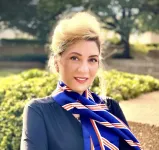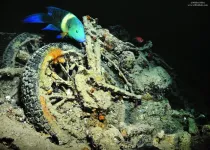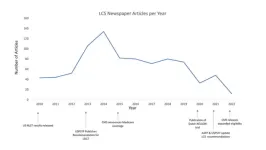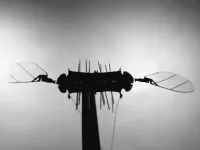(Press-News.org) PHILADELPHIA – The Pezcoller Foundation–American Association for Cancer Research (AACR) International Award for Extraordinary Achievement in Cancer Research will be presented to Tak W. Mak, PhD, Fellow of the AACR Academy, during the AACR Annual Meeting 2023, April 14-19 at the Orange County Convention Center in Orlando, Florida.
Mak is a senior scientist at the Princess Margaret Cancer Centre, University Health Network, as well as a university professor in the departments of medical biophysics and immunology at the Temerty Faculty of Medicine at the University of Toronto and a professor in the department of pathology at the University of Hong Kong. He is being recognized for leading the group that cloned the human T-cell receptor beta chain, a key component of the immune response, which has helped stimulate a remarkable series of advances in cancer immunology research. He is also being recognized for his enormous contributions to cancer biology, highlighted by his generation of genetically modified mouse models, which have allowed for in-depth investigations into cancer initiation and progression.
The Pezcoller Foundation-AACR International Award for Extraordinary Achievement in Cancer Research was established in 1997 to recognize a scientist who has made a major scientific discovery in basic or translational cancer research. The awardee must be active in cancer research, have a record of recent noteworthy publications, and conduct ongoing work that holds promise for continued substantive contributions to progress in the field of cancer.
Mak’s group was among the first to generate genetically modified mouse models to study the molecular mechanisms driving immune system development and control and how perturbations to such processes contribute to tumorigenesis. His examinations of these mouse models helped elucidate critical intracellular signaling pathways that govern immune responses, malignant cell transformation, cellular survival, and programmed cell death. His discoveries have had a substantial translational impact; his team demonstrated that CTLA-4 is a negative regulator of T-cell activation, a finding that James P. Allison, PhD, FAACR, later leveraged to conceptualize and design the first immune checkpoint inhibitor employed as a cancer therapeutic. Mak’s characterization of T-cell receptors has also paved the way for the development of CAR T-cell technology, a treatment option now approved for certain leukemias and lymphomas. Mak’s work on oncogenic IDH enzymes also led to the development of IDH1/2 inhibitors and their subsequent approval for the treatment of acute myeloid leukemia. His group is currently investigating how various IDH mutations are capable of driving brain and blood cancer malignancies and confer the ability of cancer cells to survive under harsh environmental conditions that would normally result in cell death. He has also recently bolstered the concept that immune responses are connected directly to the nervous system through effector T cell secretion of the neurotransmitter acetylcholine.
“Dr. Mak is a pioneer in cancer immunology, and he continues to break important new ground,” said Margaret Foti, PhD, MD (hc), chief executive officer of the AACR. “His discoveries have helped to provide the scientific foundation for the immunotherapy revolution, which has saved and extended so many lives from cancer. We are deeply honored to present Dr. Mak with this most prestigious of awards in our field.”
“We are especially happy and proud that the Pezcoller Foundation-AACR International Award will be given this year to Tak Mak, a pioneer of modern cancer immunology, who also elucidated many crucial mechanisms of the cancer cell, from carcinogenesis to survival in a hostile environment, and the close connection between the immune and the nervous systems,” said Enzo Galligioni, MD, president of the Pezcoller Foundation. “Because of the exceptional nature of his discoveries and the continuity of his research, he ranks among the greatest scientists who have deserved to win the Pezcoller-AACR Award. We are grateful to AACR for our 25-year partnership, which always recognizes and rewards the best cancer researchers.”
Mak joined the AACR in 1990 and was elected as a Fellow of the AACR Academy in 2013. Mak is a scientific editor of the AACR journal Cancer Discovery. He is also an advisory board member for the Stand Up To Cancer (SU2C)-Lustgarten Foundation Pancreatic Cancer Interception Dream Team. The AACR serves as the Scientific Partner of SU2C. He has been involved with numerous AACR committees, including as a member of the AACR Princess Takamatsu Memorial Lectureship Committee (2020-2022), member of the AACR Nominating Committee (2018-2020), co-chair of the AACR Annual Meeting Program Committee (2018-2019), ex officio member of the Board of Directors of AACR International – Canada (2017-2019), chair of the Regional Advisory Subcommittee – Canada (2016-2019), member of the AACR International Affairs Committee (2015-2018), member of the AACR Outstanding Investigator Award for Breast Cancer Research Committee (2015-2016), member of the AACR-Millennium Fellowship in Hematologic Malignancies Research Committee (2014-2016), and member of the AACR Special Conferences Committee (2011-2017).
Mak’s scientific achievements have been recognized with numerous awards and honors, including the Canadian Cancer Society Lifetime Contribution Award (2022), the National Foundation for Cancer Research Albert Szent-Györgyi Prize for Progress in Cancer Research (2021), the Society for Immunotherapy of Cancer (SITC) Team Science Award (2020), the Weinman Award (2019), the Canadian Institutes of Health Research Gold Leaf Prize for Discovery (2018-2019), the Anthony Cerami Award in Translational Medicine (2016), the German Signal Transduction Society Honorary Medal (2016), the University of British Columbia Faculty of Medicine Dr. Chew Wei Memorial Prize in Cancer Research (2014), the Premier’s Summit Award in Medical Research (2007), the Paul Ehrlich and Ludwig Darmstaedter Prize (2004), the Canada Council for the Arts Killam Prize (2003), the General Motors Cancer Research Foundation Alfred P. Sloan Jr. Prize (1996), the National Cancer Institute of Canada Robert L. Noble Prize (1996), the King Faisal Prize for Medicine (1995), the Royal Society of Canada McLaughlin Medal (1990), the Gairdner Foundation International Award (1989), and the Emil von Behring Prize (1988).
Mak was inducted into the Canadian Medical Hall of Fame (2009), awarded the Order of Ontario (2007), and selected as an Officer of the Order of Canada (2000). He is an elected Fellow of the Academy of Immuno-Oncology (2022), member of the American Academy of Arts & Sciences (2005), Foreign Associate of the National Academy of Sciences (2002), Fellow of the Royal Society of London (1994), and Fellow of the Royal Society of Canada (1986).
He received his undergraduate degree in biochemistry and master’s in biophysics from the University of Wisconsin. He completed his PhD in biochemistry at the University of Alberta.
Mak’s award lecture will be presented on Sunday, April 16, at noon ET.
END
Tak W. Mak, PhD, FAACR, selected for 2023 Pezcoller Foundation-AACR International Award for Extraordinary Achievement in Cancer Research
2023-03-15
ELSE PRESS RELEASES FROM THIS DATE:
Kermanshachi receives 40 Under 40 award
2023-03-15
Sharareh “Sherri” Kermanshachi, a University of Texas at Arlington associate professor of civil engineering, has received the 40 Under 40 Award from Mass Transit magazine, which recognizes individuals who have shown a capacity for innovation and demonstrated leadership and a commitment to making an impact in transit.
“I am honored and humbled to receive this award and be named to the 40 Under 40 Mass Transit award list,” said Kermanshachi, who is also director of the Resilient Infrastructures and Sustainable Environment ...
Nobel Laureate Carolyn R. Bertozzi, PhD, to receive 2023 AACR Award for Outstanding Achievement in Chemistry in Cancer Research
2023-03-15
PHILADELPHIA – The American Association for Cancer Research (AACR) will honor Nobel Laureate Carolyn R. Bertozzi, PhD, with the 2023 AACR Award for Outstanding Achievement in Chemistry in Cancer Research during the AACR Annual Meeting 2023, April 14-19 in Orlando, Florida.
Bertozzi is the Anne T. and Robert M. Bass Professor of Chemistry in the School of Humanities and Sciences and a professor (by courtesy) of chemical and systems biology and of radiology at Stanford University, an investigator with the Howard Hughes Medical Institute, and the Baker Family Director of Sarafan ChEM-H. Bertozzi is being recognized for advancing basic ...
Study offers a potential strategy to improve T cell therapy in solid tumors
2023-03-15
PHILADELPHIA – A new approach that delivers a “one-two punch” to help T cells attack solid tumors is the focus of a preclinical study by researchers from the Perelman School of Medicine at the University of Pennsylvania. The findings, published in the Proceedings of the National Academy of Sciences (PNAS), showed that targeting two regulators that control gene functions related to inflammation led to at least 10 times greater T cell expansion in models, resulting in increased antitumor immune activity and durability.
CAR T cell therapy was pioneered at Penn Medicine by ...
Uncovering the ritual past of an ancient stone monument in Saudi Arabia
2023-03-15
A comprehensive analysis of an archaeological site in Saudi Arabia sheds new light on mustatils—stone monuments from the Late Neolithic period thought to have been used for ritual purposes. Melissa Kennedy of the University of Western Australia, Perth, and colleagues, in conjunction with The Royal Commission for AlUla present these findings in the open-access journal PLOS ONE on March 15, 2023.
Built around 7,000 years ago, mustatils are rectangular, low-walled, stone structures that range from 20 to 600 meters in length. Researchers first discovered them in the 1970s, and more than 1,600 mustatils have now been discovered, primarily concentrated in northern ...
The WWII shipwreck of the SS Thistlegorm, now a popular Red Sea dive site, has formed an artificial coral reef for a diverse community of fish, according to data gathered by volunteer divers
2023-03-15
Article URL: https://journals.plos.org/plosone/article?id=10.1371/journal.pone.0282239
Article Title: Eight years of community structure monitoring through recreational citizen science at the “SS Thistlegorm” wreck (Red Sea)
Author Countries: Italy
Funding: STE project was funded by Project AWARE Foundation, ASTOI Association, Ministry of Tourism of the Arab Republic of Egypt, Settemari S.p.A Tour Operator, Scuba Nitrox Safety International, Viaggio nel Blu Diving Center. The funders had no role in study design, data collection ...
Analysis links specific skills taught by US undergraduate degree courses with graduate earnings
2023-03-15
Article URL: https://journals.plos.org/plosone/article?id=10.1371/journal.pone.0282323
Article Title: Connecting higher education to workplace activities and earnings
Author Countries: USA
Funding: This research is supported in part by the University of Pittsburgh Pitt Momentum Fund and the Center for Research Computing. This work has been supported (in part) by # 2109-33808 from the Russell Sage Foundation. Any opinions expressed are those of the principal investigator(s) alone and should not be construed as representing the opinions of the Foundation. The funders had no role in study design, data collection ...
Estrogen possible risk factor in disturbed heart rhythm
2023-03-15
The sex hormone estrogen has a negative impact on heartbeat regulation, according to an experimental study from Linköping University, Sweden, published in Science Advances. Estrogen impact seems to interact with hereditary changes causing a heart disease disturbing the heart’s rhythm, while other endogenous substances may have a protecting effect.
In a lifetime, the heart beats around 2.5 billion times. Each heartbeat is triggered by an electrical impulse that causes the heart muscle to contract in a very well-coordinated movement. ...
Radar images record potential volcanic activity on Venus
2023-03-15
Researchers have identified evidence they interpret as active volcanism on the surface of Venus, according to a new analysis of radar images from the Magellan spacecraft. The images reveal a vent that changed shape on Venus, which they believe points to ongoing volcanic activity there. Many volcanoes have been identified on the surface of Venus, but evidence of recent volcanic activity on the planet has been lacking. As a result, it was unknown whether the prominent volcanic features of Venus’ geologically young surface are a product of ongoing active volcanism ...
AJR on a decade of lung cancer screening in American newspapers
2023-03-15
Leesburg, VA, March 15, 2023—According to an accepted manuscript published in ARRS’ own American Journal of Roentgenology (AJR), sentiment of U.S. newspaper articles covering lung cancer screening (LCS) from 2010 to 2022 was overall positive; however, certain key elements of LCS were infrequently mentioned.
“The findings highlight areas for potential improvement of LCS media coverage; radiologists have an opportunity to take a more active role in this coverage,” concluded first author Brent P. Little, MD, of Mayo Clinic Florida in Jacksonville.
Little et al. searched the ProQuest U.S. Newsstream ...
Resilient bug-sized robots keep flying even after wing damage
2023-03-15
Bumblebees are clumsy fliers. It is estimated that a foraging bee bumps into a flower about once per second, which damages its wings over time. Yet despite having many tiny rips or holes in their wings, bumblebees can still fly.
Aerial robots, on the other hand, are not so resilient. Poke holes in the robot’s wing motors or chop off part of its propellor, and odds are pretty good it will be grounded.
Inspired by the hardiness of bumblebees, MIT researchers have developed repair techniques that enable a bug-sized aerial robot to sustain severe damage to the actuators, or artificial muscles, that power its wings — but to still fly effectively.
They optimized these artificial muscles ...






